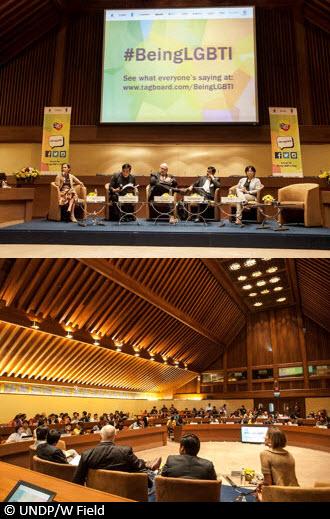
UNESCO Bangkok will oversee the educational component of the second phase of a regional United Nations Development Programme (UNDP)-led initiative to uphold the rights of lesbian, gay, bisexual, transgender and intersex (LGBTI) people.
Last week, the UNDP, the Embassies of Sweden and the United States to Thailand and USAID launched phase two of the US$8 million “Being LGBT in Asia” (BLIA) initiative.
UNESCO Bangkok will support the educational aspects of this initiative, in keeping with the organization’s overall mandate to promote respect for diversity through learning, said Justine Sass, Chief of the HIV Prevention and Health Promotion (HP2) Unit at UNESCO Bangkok.
“UNESCO’s role in the second phase of the Being LGBT in Asia initiative will enable us to expand our work on homophobic and transphobic bullying in the region,” she said. “Our engagement in this recognizes the work UNESCO has done to build knowledge and expand initiatives aimed at addressing this issue, particularly the role of education in promoting acceptance of diversity in all its many forms.”
The overall aim of the “BLIA in Asia – Phase 2” initiative is to strengthen and empower LGBTI regional advocacy groups and community networks in Asia, with targeted support to four countries, namely China, Indonesia, the Philippines and Thailand.
As part of this wider initiative, UNESCO will advocate on behalf of sexual orientation and gender identity (SOGI) issues in the education sector. This includes not only awareness-raising, but ensuring that policy-makers have evidence-based policy recommendations at hand that they can use to make their education systems more responsive to SOGI.
Homophobic bullying in schools will be a particular point of focus for UNESCO, building on the study released in 2013 by the Bangkok office and partners that showed the disturbing extent to which this type of harassment affects young learners in Thailand.
The successful research methodology established in the Thai study will be applied in other countries to get a broader view of the nature and scope of homophobic bullying in Asia-Pacific. With this information, the office will aim to help facilitate national coalitions in at least four countries, comprising stakeholders, civil society groups and those in the education sector to prevent homophobic bullying and to address broader exclusion of gender and sexual minorities in the education sector.
The launch of the second phase of the BLIA was followed by the “Regional Dialogue on LGBTI Human Rights and Health in Asia-Pacific on 26-27 February 2015 at the UN Conference Centre. As part of the dialogue, UNESCO Bangkok hosted an emotional session in which LGBTI delegates from throughout the region shared their firsthand experience dealing with homophobic bullying.
During the first phase of the “Being LGBT in Asia”, over 650 LGBTI people and 220 organizations were interviewed throughout the region, offering deeper insights into the rights issues concerning these communities and supporting emerging support networks.
The reports found discrimination a stark reality for LGBTI people in virtually all aspects of their life, from family and the home to the workplace and in social sectors, such as health and education.
“The importance of public laws, policies and programmes that are inclusive of all populations, including vulnerable groups such as LGBTI people, cannot be stressed enough,” said Caitlin Wiesen, Chief, Regional Policy and Programme for Asia and the Pacific, UNDP at the phase two launch. “In Asia and the Pacific, LGBTI people are routinely stigmatized by society and often subject to discrimination and violence, this includes limited access to employment and education opportunities, as well as barriers to accessing health and social protection services.”
In a press release, the UNDP noted that the overall aim of the project’s second phase is to “work closely with community based organizations and national human rights institutions to strengthen their capacity to advocate effectively and implement sensitization trainings with members of national judiciaries and lawmakers and local government units. It will also engage the private sector through regional research and consultations on sexual orientation and gender identity issues in the workplace.”
View video: Stronger together: A look back at the Regional Dialogue on LGBTI Human Rights and Health in Asia-Pacific
Related links:
